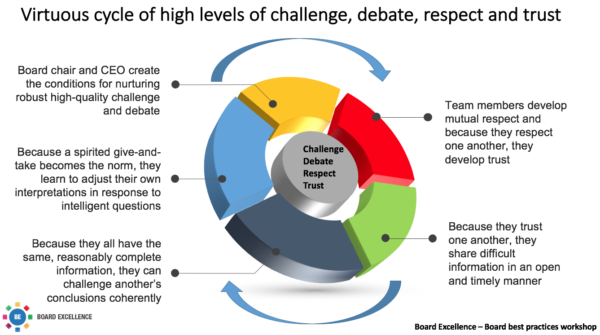One of the hallmarks of high-performing board teams is an ability for the board team to demonstrate consistently strong levels of high-quality challenge and debate which not only optimises the core functioning and decision-making capability of the board but builds sustainable high levels of respect and trust between the executive and non-executive board members. Each time I have seen a board team make a step change in their effectiveness and performance, this virtuous cycle of challenge, debate, respect and trust takes hold, is nurtured in particular by the board chair and CEO enabling the board team to really “get at it” and push each other collectively to identify and face up to the big elephants in the board room, understand the root causes of for example serious under-performance, identify creative solutions and transformative strategic opportunities as well as optimise the “big decisions” of the board. This virtuous cycle is illustrated here in an extract from our board best practices workshop and we will now explore below the typical challenges board teams face in this area and how board teams in practice can improve the level and quality of challenge and debate which in turn builds strong levels of respect and trust.

The challenge for board teams has never been greater in terms of the unrelenting wave of disruption happening in every sector : radical new business models, ferocious competition, regulatory change, new business models, technology disruption and geo-political crises. Each board team needs to be at the top of its game to help navigate the organisation through very turbulent waters as well as grasp significant strategic opportunities. Outstanding levels of high-quality challenge and debate enable the board team to really push each other to maximise its intellectual firepower, the expertise and experience of each board member, the diversity of thinking styles around the table, the independence of the non-executive directors and in doing so to help the board team make the very best decisions as well as “see around dark corners” to spot early serious risks and threats to the organisation.
Why do so many board teams, even with highly experience executive and non-executive directors, struggle in the area of challenge and debate ? There are multiple reasons including ;
- Poor leadership by the board chair and CEO in terms of enabling the highest levels of openness, accountability and legitimising genuine robust constructive challenge of the executive team
- Lack of understanding by both execs and non-execs as to how each individual board members needs to effectively contribute and behave in terms of tough challenge and resulting debates
- A defensive attitude by the CEO and executive team that neither welcomes or facilitates challenge by the non-exec directors
- A poor attitude and approach by the non-exec directors in terms of low-quality aggressive questioning, laziness/refusal to study the materials/issues properly or unnecessary challenge and second-guessing of the executive team
- The board team in cruise mode and too much politeness around the board table in terms of avoiding tough intense debates and the board team really stretching its thinking
- In-appropriate influence being exerted through one or more non-executive directors by either a major shareholder or sub-set of shareholders which impacts on the engagement model between executive team and non-executive team
- Poor management of conflict and tension where in particular, the key levels of constructive tension needed for high-quality debates are allowed to morph into damaging conflict
In the excellent 2017 joint publication between the ICSA – The Governance Institute and The Henley Business School “Conflict and tension in the Boardroom – how managing disagreement improves board dynamics – A. Kakabadse, N. Kakabadse, P. Moore, F. Morais and R. Goyal ”, the authors provide a very compelling insight into the critical role that constructive challenge and tension plays in board team dynamics. They outline the critical importance of the board chair and the board secretary working very thoughtfully to ensure that the tension generated by this constructive challenge does not develop or degenerate into destructive conflict. A quote in this report from a company secretary really struck me “It can be surprisingly quick for tension to escalate to the point of being disruptive and damaging. It can happen in the blink of an eye, because it comes back down to an emotional response”. Tension can transform into conflict quickly, and the tipping point is almost always the result of a situation becoming emotionally charged. It is critical for the board chair to deal with potential conflicts rapidly to avoid a damaging and often irreparable breakdown of trust and loss of respect.
As a former CEO and executive director, I can recall very vividly my own feelings when seriously challenged by the non-executive directors in our board team. On many occasions, my immediate reaction was a level of frustration translating to “ they don’t really understand this in the way both I and my exec team do, did they not read the board pack properly ?, have they any idea of how hard we’ve worked on this strategy and now they are tearing it to shreds ?, how much do I need to open the kimono here as we’re struggling to fix this problem and we’re getting into Pandora’s box territory if a serious debate opens up here ….”. I was blessed with some outstanding non-execs on my board so I got religion pretty quickly on the value the non-execs were bringing, their critical oversight role and me as CEO setting the example to all the executive team on welcoming the challenge and debate however uncomfortable it was. As a board chair and non-executive director over recent years, I have seen the other side of the coin on how frustrating it can be for a non-executive director who is working very hard, raises genuine constructive concerns, issues, tough feedback etc. and who is met with strong resistance, very defensive behaviours and a lack of openness to genuinely respond thoughtfully and engage in the required debate to enable the board to fully understand the issues and optimise resulting actions and decisions.
In terms of the practical steps to develop a virtuous cycle of challenge, debate, respect and trust within your board team, here are the recommended key steps and phases that we have seen work well for board teams ;
Board chair and CEO creating the conditions for nurturing high-quality challenge and debate
The board chair has a critical leadership role in legitimising challenge, encouraging the non-execs to provide strong constructive intelligent oversight of the executive team and to facilitate high-quality robust debate. Likewise, the CEO has a key role in setting the example personally for all of the exec team of openness, accountability and engaging with the non-execs to debate the key issues
Board team members developing mutual respect and because they respect each other, they develop trust
As in all walks of life, as a board team improves the level of constructive challenge and debate, this gradually builds the levels of respect and trust of each other. You will always have tension and even in the case of very high levels of respect and trust, you will always have clashing views, a board member lose the plot on a particular item, serious performance issues, negative surprises, unexpected crises etc. which all go to make up the cut-and-trust of any board team !
As the board members increasingly trust one another, they share difficult information and perspectives in an open, timely and constructive manner
It is a lot easier to be on the receiving end of some tough challenge, negative feedback and contrary perspectives to your own, when you trust the board member raising them. You might still struggle with the emotional side of it and disagree with their perspective but over time when you realise the board member is genuinely doing their job properly, you listen properly, understand their view point which enables you to contribute effectively to the discussion.
As all of the board team members have the same, reasonably complete information, they can challenge each other’s conclusions coherently
A board team can be at its very best in terms of challenge and debate when all of the board members feel that everything is out on the table, no information has been held back and for better or worse, the brutal reality is in front of the board team. This usually requires an extremely open and highly accountable CEO and executive team who will provide the board with a very honest comprehensive picture and flag bad news early even it reflects poorly on the executive team’s performance. This also requires a very high-quality board information model which enables the non-execs in particular to understand what often is a very large complex maze of operational, financial, sales, people and risk data.
As a spirited give-and-take becomes the norm, each board members listen more effectively and learns to adjust their own interpretations in response to intelligent thoughtful questions, responses and perspectives.
This is ultimately what distinguishes the best board teams in this area as they ensure that every board member’s expertise, insights, judgements, experiences, diversity of thinking style and gut intuition is maximised for the collective good of the board team to optimise its decision-making, getting on top early in a crisis and identifying the transformational strategic opportunities.
In summary, every board team has the potential to improve the levels of challenge, debate, respect and trust in the board team. It takes genuine commitment by all board team members and outstanding leadership by the board chair, CEO and company secretary.The encouraging thing I have seen in many board teams is that this becomes a virtuous cycle where each improvement builds on the others and the board can see the improvement in action in terms of its effectiveness and performance as a board team. I always say to board teams that if their shareholders were to be streamed the next board meeting live, one of the things they would be most anxious to see are extremely committed hard working board members engaging in high-quality robust challenge and debate in an environment of genuine respect and trust, pushing each other very hard to understand and debate complex issues, face up to serious issues and risks, identify and brainstorm viable solutions and ultimately optimise their decision-making to ensure the long-term success for the shareholders and stakeholders of the organisation.
Kieran Moynihan is the managing partner of Board Excellence ( https://boardexcellence.com) – supporting boards & directors in Ireland, UK and internationally excel in effectiveness, performance and corporate governance.
Think your business could benefit from our services and expertise? Get in touch today to see how we can support your board excel for its shareholders, employees and stakeholders.
.

